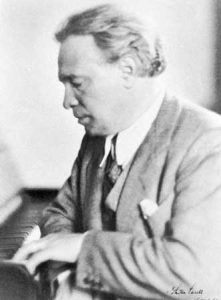HOME
> PIANO WORKS
> O.Respighi

Ottorino Respighi
1879-1936
Born in Bologna, Italy in 1879. He learned music from his father, who was a musician, and studied at the Bologna Music School. Later, while working as a viola player at the St. Petersburg Opera House, he was shocked by the music of Rimsky-Korsakov and had the opportunity to learn composition and orchestration from him.
While building his career as a viola player and pianist, he released his own works and gradually gained recognition as a composer.
In 1913, he became professor of composition at the Santa Cecilia Conservatory in Rome, and later served as its director, but resigned after two years to focus on composing. This was the period when Respighi’s masterpieces were born, including the three symphonic poems known as “the Roman Trilogy” , 〈Fountains of Rome〉, 〈Pines of Rome〉, and 〈Roman Festivals〉, as well as 《Church Windows》. Respighi also loved Italy and was interested in old Italian music, and released a piece called 《Ancient Airs and Dances》, based on lute music from the 16th and 17th centuries.
Respighi’s music, which uses grand orchestration influenced by Rimsky-Korsakov and others, is extremely brilliant, producing large waves of sound along with beautiful melodies born from Italy’s rich musical culture. It overwhelms us and has a powerful charm that draws us deeply into his world of sound. Respighi, who passed away in Rome in 1936, loved Italy and Italian music until the end and spent most of his life in Rome.
When you think of Respighi, you think of the “Roman Trilogy.” These works are so major that they are even included in school textbooks in Japan, and there is no doubt that they are masterpieces. I have heard a live performance of Respighi’s work, and I remember being simply overwhelmed by the strength of the music, the thick sound penetrating every corner of my body, and I felt as if I was thrown into another world… I remember being in a daze.
However… his piano pieces are so under the spotlight, it’s a pity. Although there are not many of them, they are filled with beautiful and sweet melodies, and layers of heavy and glittering sound reminiscent of his orchestral works… They are all pieces that pay respect to classical style while shining with a modern vividness. As expected from Italy, the “country of song” where songs and operas have developed richly, all of the pieces have emotional melodies that make you think the lyrics are in them. Perhaps because he is a composer who has had one big hit, or because there is a lack of piano pieces by Italian composers in the first place, there are few recordings of his piano pieces, and they are rarely seen in concerts. … I’ve been complaining at length. But that’s just how good they are.
Piano Solo
Scherzo B-flat major P.4c
Piano Sonata A minor P.4b
Presto F major P.4d
Andante F major P.6
Andante E major P.6a
Andante D major P.7
Allegro B minor P.10
Piano Sonata F minor P.16
Piano Suite P.22
Prelude B-flat major P.23
Fuga and Reale in 3 voices C major P.23a
Piano Suite P.43
Prelude D minor P.43a
6 Pieces P.44
Ancient Airs and Dances P.114
3 Preludes on Gregorian Melodies P.131
Piano Duo
6 Little Pieces for piano 4 hands (Sei Pezzi per Bambini per Pianoforte a 4 mani ) P.149
References